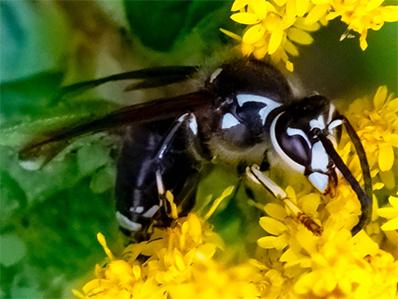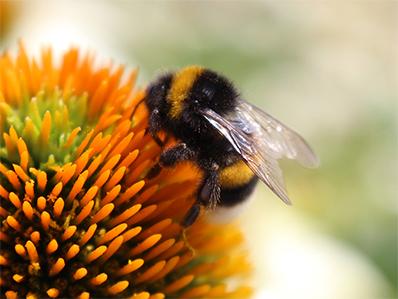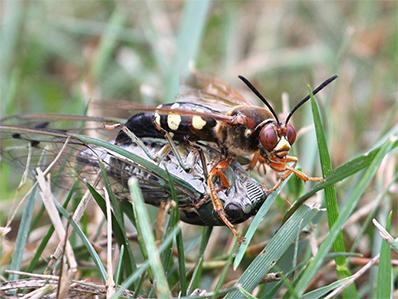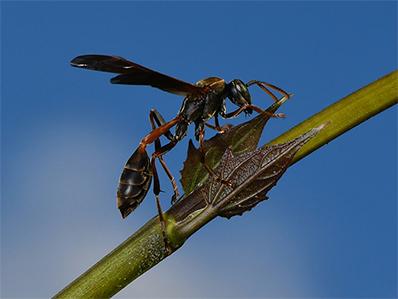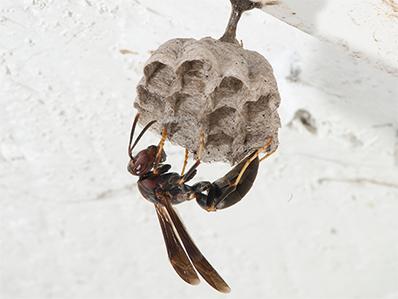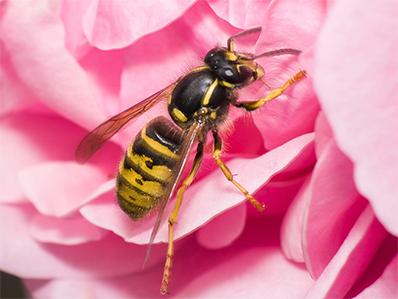There are three seasons out of the year when stinging insects are usually an issue for homeowners. In the spring, when warm temperatures return, overwintering wasps and hornets emerge to find a location for new nests. Most will not return to old nests and will start to create new nests under rooflines, in rafters, under decks, inside holes, and in other shelter places. During the summer months, they grow those new nests and build their populations. In fall, just before the cold weather sets in, wasps and hornets busily work to prepare newly produced female reproductives to make it through winter to ensure the continuation of their species. The only season we typically get a break from stinging insects is winter. But, stinging pests are enough of a problem during the other three months to make up for the forth. If you've dealt with stinging pests in the past or you're hoping to prevent a run in with stinging pests in the future, it helps to know what attracts stinging insects to your home.
Why paper wasps and baldfaced hornets are attracted to your home
Stinging insects such as paper wasps and baldfaced hornets are drawn to a home simply because there are overhangs. There isn't a lot you can do about that. But wasps and hornets will prefer to use an overhang that is near a food source. Their preferred food source is bugs. Everything you do to reduce bugs in your yard will have an impact on stinging pest populations.
Why cicada killer wasps and yellow jackets are attracted to your home
Some wasps prefer to build their nests in the ground. Yellow jackets use holes created by animals or holes in the root structures of trees. Cicada killer wasps excavate their own underground burrows. When yellow jackets come into your yard, they will be happy to stay if they can find a nice hole to make a nest in. When cicada killer wasps come into your yard, they'll be looking for sand or some other grainy soil material.
Why do I have a bumble bee problem on my property?
When bumble bees come into a yard, they're looking for flowers. While all stinging insects feed on nectar from flowers and flowering plants, bumble bees are particularly motivated by the availability of this important resource.
Like yellow jackets, bumble bees will make ground nests in holes that have been abandoned by rodents. So, holes in your yard is like putting out the welcome mat.
What attracts stinging insects to my property?
Since all stinging insects are attracted to flowers, it is best to not have a home that reminds bees, wasps, and hornets of flowers, such as bright yellow paint or siding. It is also best to not have sweet smells outside. These can draw stinging insects from quite a distance.
Paper wasps, yellow jackets, and other wasps and hornets that feed on bugs may look for protein in exterior trash. Yellow jackets are notorious for buzzing around trash bags. If you want fewer stinging pests, keep your exterior trash in sealed receptacles.
Pest control for bees, wasps and hornets
It is not usually ideal to reduce flowers or flowering plants to control stinging pests but you may not have to. When you have a year-round pest control program, your service professional will do routine inspections of your property and address any nests found. You'll also get appropriate treatments applied around your property to reduce the bugs that get into landscaping and gardens. This reduction of plant pests will have the side benefit of reducing stinging pest populations in your yard.
If you live in Morganville, Chatham, Montclair or the surrounding area, consider Arrow Pest Control for your residential pest control needs. We offer affordable, effective, and comprehensive pest control packages that give coverage for over 30 pests that can bite, sting, spread illness, and damage your property. While it is certainly no fun to be stung by a bee, wasp, or hornet, there are pests in New Jersey that can transmit serious diseases to you, your family, and your pets. No New Jersey home should be without a pest plan.
Home Protection Program
Service consists of the elimination of your current pest or rodent problem, complemented by both interior and exterior year-round protection of your home, which is inclusive of three seasonal visits. The program covers your entire property including attics, mailboxes, playsets, sheds, and fences.
Pests targeted with Arrow’s Home Protection Plan services include ants (excluding carpenter ants, pharaoh ants and acrobatic), bees, boxelder bugs, carpenter bees, carpet beetles, centipedes, cicada killers, clover mites, crickets, digger bees, earwigs, fabric & paper pests, fleas (inside only), ground beetles, hornets, mice, pillbugs, millipedes, rats, roaches, silverfish, sowbugs, spiders, springtails, stored product pests, and wasps.
*If you have a pool house that requires service, pricing would increase based upon the size of the structure.


Testimonials
Request Your FREE Estimate
Additional Services
Our solutions are designed for even your toughest pest problems.
Don’t let pests affect your quality of life, here's how we can help:

